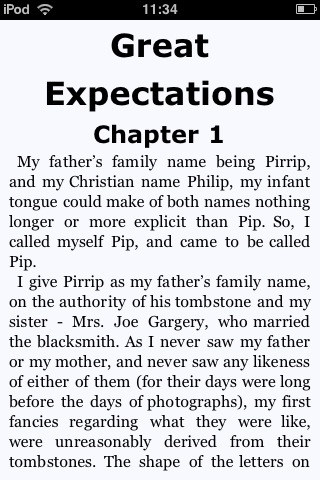I’m an avid ebook reader. I’ve been reading ebooks on a variety of devices right from 2004 when I got my first Palm Tungsten T. Since then I’ve had an O2 XDA IIs and finally, an iPod Touch. It’s no exaggeration to say that I’ve given up physical books completely and ever since I made the switch, I’ve never looked back. As such, I’m in a perfect position to comment on the sad state of ebook formats in acceptance these days.
The nub of the problem is this – each agency has it’s own way of deciding in what manner each ebook must be presented. It’s irritating because ereaders (applications that read the ebooks) support certain formats only and will not open ebooks encoded in another way. So the end result is that you sometimes have to have multiple ebook applications on your device in order to be able to open all the various types of formats. Of course, everyone has his or her own favorite application and thus gets into a tizzy trying to convert ebooks into a format that their application supports.
Image Credit: Sigalakos

There are pieces of software that are able to convert between different formats. But this can be a complex task as well. Some converters only convert between two specific formats. So if you want to convert from format A to fomat C, you may have to find one that first converts from A -> B and then from B->C.
Examples of file formats are txt, lit, pdf, doc, pdb, html, mobi, azw, opf, chm, and the new open source epub.
This unfortunate situation has resulted in the PDF format being widely accepted as a “normal” standard for ebooks. This is a terrible choice, and one made only out of necessity since PDF files are not meant to be read on a wide variety of devices. They are “fixed” layout files that display ideally on the screen size they were originally made for. When you try to convert the format for a mobile device, the line breaks and paragraphs don’t always render correctly. Reading a PDF file in it’s native format on a mobile phone is even worse. The navigation is clumsy and the zooming is always a problem.
Format Lock in
Of course, it’s in the interest of the publishing houses that people use only their readers that read only their formats. Mobipocket has the .mobi file type that is proprietary. Kindle has it’s own proprietary .azw format (like we needed another file type.)
For the benefit of the consuer, an open standard for ebooks is necessary that is adopted by everyone and all ebook readers. Once a large number of people start using this open standard and ereaders start supporting it, book publishers will be forced to offer their books in the same format. Network externalities are powerful forces.
Already, the EPUB (.ebub) format is approaching this goal. It’s open, and standardized. The goal is to ensure that all readers support epub files and there are a few tools that create these files. I’ve recently been using the free open source Calibre to convert ebooks to the epub format and to read on the fantastic program called Stanza (free) that reads only in the epub format.
In fact, Stanza is so good on mobile devices like the iPhone and iPod Touch that more people are using Stanza than Amazon’s Kindle! So I’ve turned into an epub fan and encourage all readers to support this open book format so that more publishers start publishing in it. This way, we will be able to secure the future of ebook reading and save ourselves from a future littered with dozens of proprietary formats and from the hair pulling of converting between them.
Bhagwad,
I too had the same issues reading e-books on my handheld device. The navigation and zooming was all the more pathetic. So I moved to Audiobooks. Since these days u have lot of memory space with your mobile, audiobooks are no more bulky types.
This save time reading as well as I can move around and work as usual with speakers on or headphone attached to my ears.
@Sajid
Actually, I've been using a handheld to read books since my MBA days :) . In our final year, I bought a second hand "Tungsten T" which served me and since then I've used an O2 XDA IIs and more recently, an iPod Touch. All of these have a big screen (specially the Touch).
I've never had any inconvenience using these handheld devices as the size of the letters is the same as that of any regular book. A lot also depends on what software you use to read. I admit that reading PDF files is a pain, but then I hate the PDF format on handhelds.
All in all, though I love a regular book as well (it's different), ebooks are cheaper, require no storage, no transportation costs and no maintenance. In addition, I can carry as many of them as I want with no extra burden since I carry my handheld with me wherever I go anyway.
However, some things need to be improved for a perfect reading experience. They are:
1. Battery life – My Touch only gives me 4-5 hrs of reading before needing a charge. Enough really but it's nice to have more.
2. Screen – Difficult to read in bright sunlight
If these two problems are solved, then I don't think there is anyone to hold back the adoption of ebooks on handheld devices.
That true bhagwad. I will suggest you audiobooks. Have a taste of their flavours even.
@Sajid
Anupa (my wife) has been listening to "The Rise and Fall of the Third Reich" by William Shirer – she really likes listening to the book as she can relax in her bus and read it.
One of these days I will give them a whirl too…